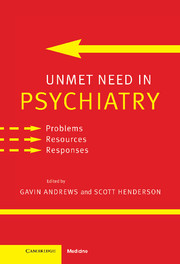Book contents
- Frontmatter
- Contents
- List of Contributors
- Preface
- Part I Unmet need: defining the problem
- Part II Unmet need: general problems and solutions
- Introduction
- 4 The epidemiology of mental disorder treatment need: community estimates of ‘medical necessity’
- 5 Some considerations in making resource allocation decisions for the treatment of psychiatric disorders
- 6 The need for psychiatric treatment in the general population
- 7 Comparing data on mental health service use between countries
- 8 The challenges of meeting the unmet need for treatment: economic perspectives
- 9 Unmet need for prevention
- 10 Meeting unmet needs: can evidence-based approaches help?
- 11 Unmet need for management of mental disorders in primary care
- 12 Is complementary medicine filling needs that could be met by orthodox medicine?
- Part III Unmet need: people with specific disorders
- Part IV Unmet need: specific issues
- Part V Unmet need: conclusion
- Index
8 - The challenges of meeting the unmet need for treatment: economic perspectives
from Part II - Unmet need: general problems and solutions
Published online by Cambridge University Press: 21 August 2009
- Frontmatter
- Contents
- List of Contributors
- Preface
- Part I Unmet need: defining the problem
- Part II Unmet need: general problems and solutions
- Introduction
- 4 The epidemiology of mental disorder treatment need: community estimates of ‘medical necessity’
- 5 Some considerations in making resource allocation decisions for the treatment of psychiatric disorders
- 6 The need for psychiatric treatment in the general population
- 7 Comparing data on mental health service use between countries
- 8 The challenges of meeting the unmet need for treatment: economic perspectives
- 9 Unmet need for prevention
- 10 Meeting unmet needs: can evidence-based approaches help?
- 11 Unmet need for management of mental disorders in primary care
- 12 Is complementary medicine filling needs that could be met by orthodox medicine?
- Part III Unmet need: people with specific disorders
- Part IV Unmet need: specific issues
- Part V Unmet need: conclusion
- Index
Summary
Introduction
One of the greatest challenges facing mental health care today is its financing. With increasing emphasis being placed on controlling costs in both publicly and privately financed health insurance systems, mental health providers need to develop informed policy on priority setting for financing mental health care and research. Research on the management of mental and addictive disorders to date has been conducted separately in various scientific disciplines such as epidemiology, clinical sciences, economics, and public health. There is a need to integrate these different research areas and, although this chapter is focused on economic perspectives, it also tries to demonstrate how researchers from different disciplines can work together to assist decision makers to formulate mental health policy. The central task for researchers who deal with the unmet need for treatment is to find efficient and equitable delivery alternatives and ways to finance a variety of mental health services in a changing mental health care system.
The economist researcher faces a number of challenges in attempting to meet the unmet need for treatment. These include:
Defining the need for treatment
Measuring need
Identifying unmet need
Establishing economic criteria for treatment
Evaluating the economic effectiveness of treatment
Estimating the cost of not treating treatable illnesses
Reducing financial barriers to treatment
These challenges include methodological issues relating to definitions, measurement, and estimation techniques as well as conceptual issues involving the formulation of mental health policy and the establishment of priorities based on scientific knowledge.
Keywords
- Type
- Chapter
- Information
- Unmet Need in PsychiatryProblems, Resources, Responses, pp. 119 - 131Publisher: Cambridge University PressPrint publication year: 2000

